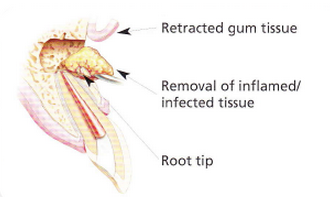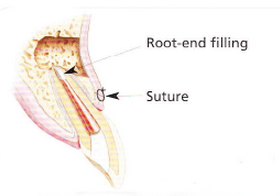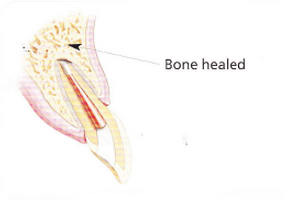Endodontic Surgery
Experienced Staff | Locally Owned Practice | 30+ Years of Experience
Your Guide to Endodontic Surgery
You are probably reading this website because your dentist or endodontist believes endodontic surgery may help save your tooth.
To understand endodontic surgery, it helps first to know something about the nonsurgical endodontic procedure, or “root canal.” A root canal is necessary when the soft inner tissue, or “pulp,” of the tooth becomes inflamed or infected. This may happen as a result of deep decay, repeated dental procedures on the tooth or a blow to the tooth. Endodontic treatment removes the damaged pulp. Then the tooth’s canals are cleaned and filled to help preserve the tooth.
In a few cases, however, nonsurgical endodontic treatment alone cannot save the tooth. In such a case your dentist or endodontist may recommend surgery.
Who Performs Endodontic Surgery?
All dentists received training in endodontic treatment in dental school. However, because endodontic surgery can be more challenging than providing nonsurgical treatment, many dentists refer patients needing surgery to a specialist. The endodontist is a valuable partner on your general dentist’s team of trusted caregivers.
An endodontist is a dentist who specializes in saving teeth. Endodontists become specialists by completing dental school followed by an additional two or more years of advanced training that includes the diagnosis and treatment of dental pain. They perform routine, as well as difficult and very complex endodontic procedures, including endodontic surgery.
Endodontists often utilize state-of-the-art technology while performing endodontic surgery. These technologies include digital imaging, operating microscopes, ultrasonic instrumentation and fiber optics while performing endodontic surgery. These specialized techniques give Endodontists a very accurate view of the tooth, helping them to treat the tooth quickly, comfortably and successfully.
Why Would I Need Endodontic Surgery?
Surgery can help save your tooth in a variety of situations.
- Surgery may be used in diagnosis. If you have persistent symptoms but no problems appear on your x-ray, your tooth may have a tiny fracture or canal that could not be detected during nonsurgical treatment. In such a case, surgery allows your endodontist to examine the root of our tooth, find the problem and provide treatment.
- Sometimes calcium deposits make a canal too narrow for the cleaning and shaping instruments used in nonsurgical root canal treatment to reach the end of the root. If your tooth has this “calcification,” your endodontist may perform endodontic surgery to clean and seal the remainder of the canal.
- Usually, a tooth that has undergone a root canal can last the rest of your life and never need further endodontic treatment. However, in a few cases, a tooth may fail to heal. The tooth may become painful or diseased months or even years after successful treatment. If this is true for you, surgery may help save your tooth.
- Surgery may also be performed to treat damaged root surfaces or surrounding bone.
Although there are many surgical procedures that can be performed to save a tooth, the most common is called apicoectomy or root-end resection. When inflammation or infection persists in the bony area around the end of your tooth after a root canal procedure, your endodontist may have to perform an apicoectomy.
What Is an Apicoectomy?
In this procedure, the endodontist opens the gum tissue near the tooth to see the underlying bone and to remove any inflamed or infected tissue. The very end of the root is also removed.
A small filling may be placed to seal the end of the root canal. This is termed "retrofilling," and a few stitches or sutures are placed in the gum to help the tissue heal properly. Over a period of months, the bone heals around the end of the root.
Are There Other Types of Endodontic Surgery?
Other surgeries endodontists might perform include dividing a tooth in half, repairing an injured or damaged root, or even removing one or more roots. Your endodontist will be happy to discuss the specific type of surgery your tooth requires.
In certain cases, a procedure called intentional replantation may be performed. In this procedure, a tooth is extracted, treated with an endodontic procedure while it is out of the mouth and then replaced in its socket. These procedures are designed to help you save your tooth.
Will the Procedure Hurt?
Local anesthetics make the procedure comfortable. Of course, you may feel some discomfort or experience slight swelling while the incision heals. This is normal for any surgical procedure. Your endodontist will recommend appropriate pain medication to alleviate your discomfort.
Your endodontist will give you specific postoperative instructions to follow. If you have questions after your procedure, or if you have pain that does not respond to medication, call your endodontist.
Can I Drive Myself Home?
Often you can, but you should ask your endodontist before your appointment so that you can make transportation arrangements if necessary.
When Can I Return to My Normal Activities?
Most patients return to work or other routine activities the next day. Your endodontist will be happy to discuss your expected recovery time with you.
Does Insurance Cover Endodontic Surgery?
Each insurance plan is different. Check with your employer or insurance company prior to treatment.
How Do I Know the Surgery Will Be Successful?
Your dentist or endodontist is suggesting endodontic surgery because he or she believes it is the best option for you.
What Are the Alternatives to Endodontic Surgery?
Though endodontic surgery is intended to help save your tooth, this is not always possible. Often, the only alternative to endodontic treatment is extraction of the tooth.
Reproduced with permission from the American Association of Endodontists.







Share On: